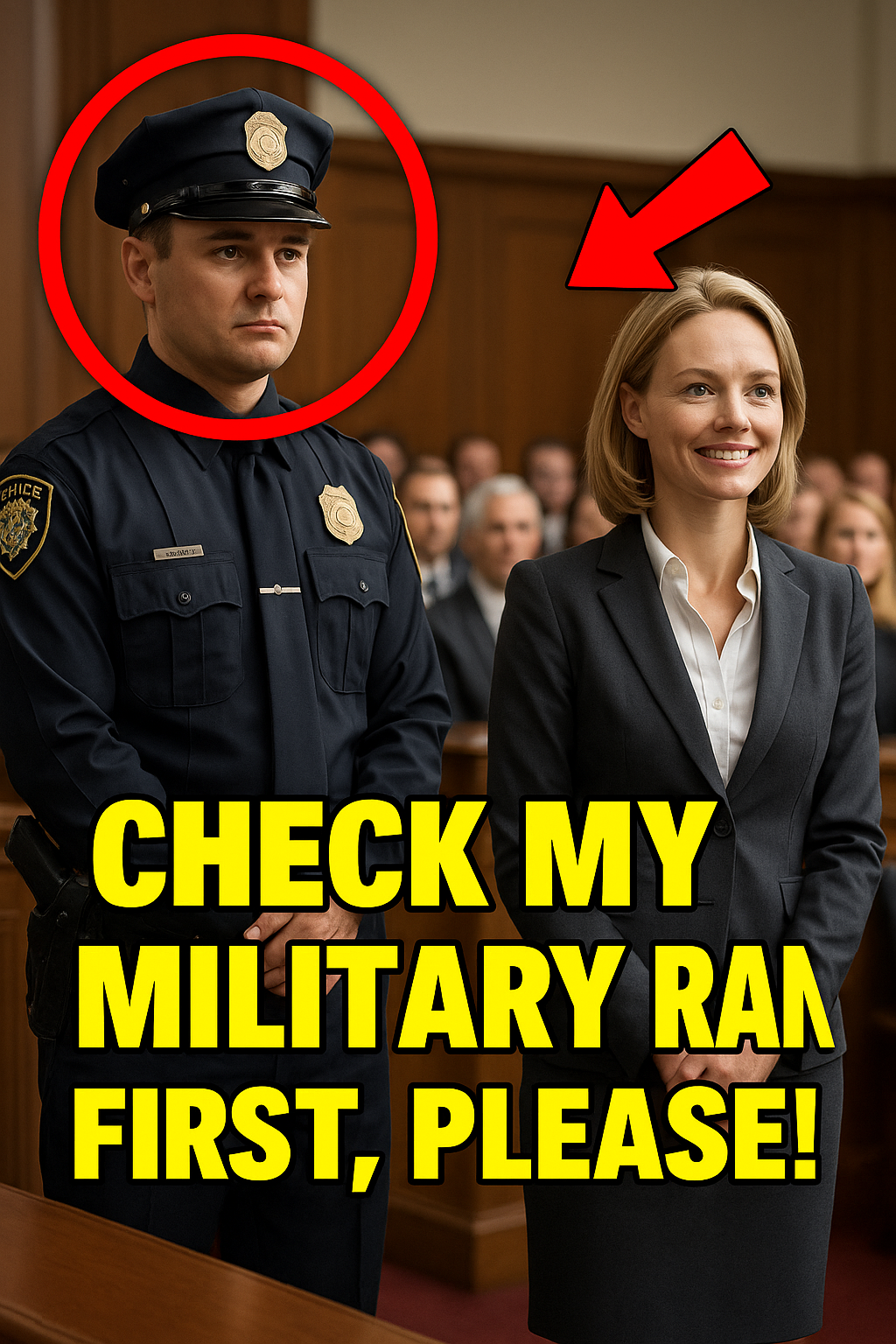He wore the badge like a suit of armor, polished so bright it caught the ceiling lights, catching eyes and respect in one flash. Officer Daniel Kerr had learned early that authority, carried with enough certainty, became a kind of magic. People stepped aside in grocery lines. Managers comped his meals. Drivers apologized before he spoke. When he sat at the plaintiff’s table that morning, chin lifted, he believed the courtroom was another room he’d command. His case was simple, he told himself: a stop, a defiant woman, a tidy arrest. The badge would speak, and everyone would listen. Or so he thought.
Then the wrong woman stood to face him. Maya Shah wore a charcoal suit and an easy, razor-edged smile that said she’d learned patience in places tougher than this polished chamber. She had been a logistics captain in the Army before law school, a fact that traveled quietly behind her like a shadow. She didn’t flash credentials, didn’t posture. When Judge Ramírez invited opening statements, Maya’s voice landed steady as a metronome. This was no viral gotcha case, she said, but a question of boundaries, truth, and the ordinary courage citizens must find when power forgets its limits. Especially in small rooms everywhere.
Daniel’s report claimed she ran a light, refused orders, and escalated. The video told a different story. Stopped at a deserted intersection late at night, Maya had asked, calm and direct, why she was being detained. Daniel answered with volume, not explanation. He reached for the car door before stating a cause, cuffed her while her ID lay visible on the dashboard, and charged obstruction when questions didn’t turn into silence. None of it was the worst abuse the city had seen. It was, Maya argued, the ordinary abrasion that becomes a wound when repeated enough times across a community. Street by street.
Daniel carried himself like a man used to winning. Every objection from Maya felt to him like insolence; every precise question sounded like a challenge to the badge itself. He kept glancing at the gallery, expecting nods from familiar faces: fellow officers, a patrol sergeant, the deputy chief. They came, they sat, they folded arms. They believed the ritual would handle the rest. But rituals bend to evidence. When Maya called the city’s own use-of-force trainer, a veteran sergeant with a quiet manner, the room tilted. The trainer reviewed frame by frame, pointing out how Daniel’s choices violated department policy. Clear as daylight.
In cross-examination, Daniel boomed about danger. He spoke of ambushes and the split-second calculus of survival. The courtroom listened; so did Maya. Then she asked about her military service. Had he noted the veteran plates? Had he seen the Army patch on the gym bag tossed in her back seat? He hadn’t. She asked what de-escalation might look like when the citizen is trained, too—trained to identify commands, to request clarity, to document. She didn’t flex credentials. She simply revealed that respect must flow both directions to work. The badge, by itself, was not a conversation; it was a starting point. For everyone.
Next came the footage from a nearby café camera, time-stamped and indifferent. It caught Daniel’s hand on the door handle, then the snap of cuffs, all before he issued a clear lawful reason. It caught Maya’s steady tone, the way her shoulders squared rather than slumped. It caught the breath of bystanders, people who would later claim they saw nothing because seeing brings responsibilities. Silence thickened across the gallery. The deputy chief stared at the floor. Daniel felt something unfamiliar: the thin edge of doubt scraping the armor he had polished. Authority, he realized, doesn’t glow; it reflects what’s placed before it faithfully.
Maya’s closing did not thunder. It walked. She described the smallness of the moment: a quiet street, a question, a decision to treat inquiry as defiance. She acknowledged danger exists and that officers deserve safety. She asked for something radical—rules applied the same way regardless of clothing, rank, or tone. She spoke like a captain counting supplies at dusk, precise and patient. Her last line carried barely above a whisper: “We are not safe when clarity is punished.” The words settled like dust motes through sunlight, ordinary, visible. Even Daniel felt them land: not a blow, exactly, more a measurement. Of necessary distance.
The verdict arrived without theatrics. The judge dismissed the charges, referred the case for departmental review, and recommended a training revision that included explicit guidance on questioning without escalation. Damages would be considered separately. What mattered, people agreed later, was the recalibration. The gallery emptied to the hallway’s fluorescent hum, where reporters sought quotes and officers avoided microphones. Daniel walked out slower than he had entered. Maya stopped near the door, extended a hand he didn’t immediately take. When he did, she squeezed once, professional, and said, “Next time, ask first.” It wasn’t triumph. It was instruction, clean and usable. For both sides.
Later, in the break room, Daniel found the badge heavy. He set it on the table and watched the overhead light pool in the curve of the shield. The thing hadn’t failed him; he had failed the thing. A symbol needs a keeper. He thought about the shortcuts—the waved-through explanations, the assumption that volume could substitute for law. Authority works only when it’s shared with accountability, when questions aren’t treated as affronts. He opened a notebook and wrote three lines: Listen. Explain. Slow down. The words looked too simple to matter. He’d learned today that simple is where discipline begins. And sometimes redemption.
As for Maya, she filed her motions, returned client calls, and attended a community meeting where residents complained about parking more than policing. Change, she knew, rarely arrives to applause. It arrives in policy memos, in slightly better choices made by tired people on rainy nights. She hoped Daniel would read the review recommendation, would teach rookies what it means to hold power with both hands open. She hoped the city would invest in training, supervision, and the unglamorous craft of documentation. She hoped, above all, that the next late-night stop would end with light, conversation, and a wave. Back into ordinary life.


